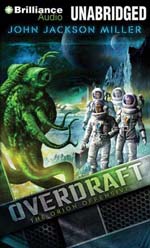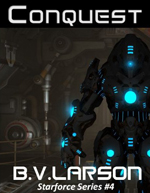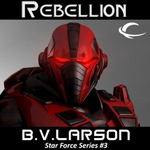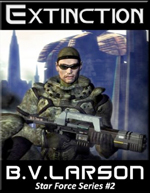
 Overdraft: the Orion Exclusive
Overdraft: the Orion Exclusive
By John Jackson Miller, Read by Luke Daniels
Publisher: Brilliance Audio
[UNABRIDGED] – 11 hours
Themes: / military sci-fi / stock market / aliens /
Publisher summary:
In the twenty-second century, humanity has journeyed to the stars, and found them open for business. And when it comes to protecting that business, Chief Bridget Yang and Surge Team Sigma—her squad of heavily armed space marines—are up to the task. Unfortunately, Jamie Sturm is one problem they can’t just vaporize. When Jamie’s financial schemes bankrupt their expedition, Bridget and her crew refuse to let the rogue stock trader walk away. To save their jobs, the soldiers drag him out from behind his desk—and onto a seemingly hopeless mission to the frontier, seeking to open the most dangerous parts of the Orion Arm to trade. But in turning over every alien rock looking for profit, the hapless trader and his reluctant protectors uncover something that endangers humanity itself.
You should read this book. You should read this book if you like adventuring soft SF. You should read this book if you like funny adventuring soft SF. You should read this book if you like funny adventuring soft SF that doesn’t take itself too seriously. So, should you read this? Only you know. Choose, but choose wisely.
The premise of Overdraft is rather underwhelming. A greedy twenty-second century stockbroker is caught before his insider trading pays dividends. In a strange twist, the stockbroker is forced into trying to earn one hundred billion dollars in one hundred days by selling wares to aliens. In the twenty-second century, Earth has joined a galactic syndicate based on the buying and selling of goods. Imagine a door-to-door salesman in space. Throw in power-armor wearing bodyguards who dislike the stockbroker, and you get a plot that seems like it should just fizzle and blow away. But it doesn’t!
Of course, anytime you try and slap funny onto SF, you know what happens. Inevitably, it always draws comparisons to that author with the alphabetical-friendly last name. We all know the writer I’m talking about. If you don’t, don’t panic! All I’m saying is that it’s not fair to forever compare humorous SF to the work of Douglas Adams. Adams is in his own galaxy. So can we please, please, oh please stop trying to measure all prospectively humorous SF to Douglas Adams?
John Jackson Miller delivers a fun space adventure that follows a fairly tight point-to-point storytelling. It never tries to be bigger/more than it is, and for this I am grateful. I thought the beginning drug on a little. I also didn’t feel the double agent was necessary to the plot, if anything it detracted from the story by injecting unneeded complication, but perhaps this is merely character maneuvering for future works in this series.
Luke Daniels narrates the audiobook. It was my first time hearing Daniels read and I admit to feeling some early trepidation. I soon stopped doubting Daniels. He brings each character to life with such subtle grace that his voice becomes the story’s voice. When this happens, when a reader just “becomes” what they are reading, it’s special.
If you can watch the original Get Smart television program without griping that it’s not James Bond, I think you’ll like this book.
Posted by Casey Hampton.
 In Enemy Hands (Honor Harrington #7)
In Enemy Hands (Honor Harrington #7) Conquest – (Star Force #4)
Conquest – (Star Force #4) Rebellion (Star Force #3)
Rebellion (Star Force #3) Crown of Slaves (Honorverse: Wages of Sin #1)
Crown of Slaves (Honorverse: Wages of Sin #1) Extinction (Star Force #2)By
Extinction (Star Force #2)By